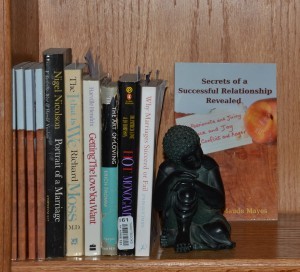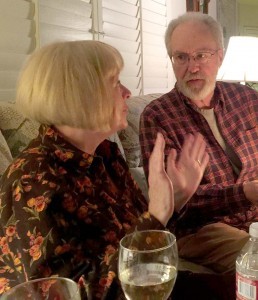Maude Mayes's Blog: Secrets of a Successful Relationship Revealed, page 103
February 3, 2016
Successful Relationships Reading Corner
 In this week’s blog article we wrote about maintaining your sacred space. Here are some articles that cover various aspects of this topic.
In this week’s blog article we wrote about maintaining your sacred space. Here are some articles that cover various aspects of this topic.
Speaking the Love Language of Quality Time “A central aspect of quality time is togetherness. I do not mean proximity. Togetherness has to do with focused attention. A husband who is watching sports on television while he talks to his wife is not giving her quality time, because she does not have his full attention.”
Sacred Space at Home This article talks about making a physical location for a sacred space “The notion of creating a ‘Holy of Holies’ in a home—a room of one’s own—came to me while exploring the connection between architecture and spirituality. ”
Make time for your partner This article talks about making time when you have children “In this busy, chaotic world of daily activities, tasks and schedules, it is easy to forget that the person you chose to spend your life with is the person who can make your days brighter and the road ahead easier to travel. For most couples, the key to improving your relationship is to make it a priority to spend more time together.”
Share0Share0
January 31, 2016
How to Maintain Sacred Space in a Relationship
In last week’s  blog we discussed what sacred space is in a relationship. In short, it’s time set aside without any outside distractions when you can enjoy each other’s company and reconnect emotionally. There are still a number of questions to be looked at. Why is sacred space important in a relationship, and how do you create and maintain it?
blog we discussed what sacred space is in a relationship. In short, it’s time set aside without any outside distractions when you can enjoy each other’s company and reconnect emotionally. There are still a number of questions to be looked at. Why is sacred space important in a relationship, and how do you create and maintain it?
Sacred space is a critical component of all successful relationships. If you are to stay in love and in true contact with your mate, you must spend time with them and share times where they have your total attention. It requires exchanges full of pleasure and shared appreciation to maintain that sense of closeness that supports an understanding that you are partners, that you’re on the same side. You need to know through the actual experience of union that you want the same things if you are to truly seek mutual solutions. It is not enough to know this in your mind or to remember it from close times gone by. This must be a regular ongoing exchange in order to create the kind of bond that leads to conflict free relating. When you share this kind of intimacy as a living part of your relationship, you will be strengthened to handle whatever life brings you, and both of you will be grounded in a flow of peace and love that allows for true partnership to flourish. Without it, you will slowly drift apart and eventually become strangers who remember a time when you were lovers and mates.
In the beginning of a relationship, you do this naturally. You concentrate on the other person in order to get to know them, and as your desire to develop the relationship grows, this interest and attention toward them also grows. You find yourself present with the other person and wanting to share your inner self with them. The connection between you is palpable and exciting.
As time goes on, many people slowly lose this element of their relationship. They get so busy with children, bills, friends and survival that the very thing that could make all of these issues work better and easier for them, their intimate connection, gets shoved to the back burner and often eventually gets lost.
So how can you maintain this connection? How can you maintain this sacred space of your relationship? The main key is that you have to make it a high priority. Make time for it. Yes, yes, we’ve all got busy lives, but that’s an excuse, not a reason. There are several ways to change this by reframing how you see things. Instead of treating everything on your to do list as chores to be done, turn this around and say to yourself “I have a rich and fulfilling life.”
Another important trick is to realize that what you choose to do represents the priority you give to it. If you never fix that dripping faucet, it’s not really that important to you. If you watch TV for three hours a night, that’s your priority. OK, it’s not as simple as that, because the list contains both pleasures and obligations, and because we all need time to unwind. But here’s the thing: time spent with your partner is time unwinding. Or if it’s not, you have some serious business to take care of.
There is a Zen saying: “Meditate for an hour each day unless you are busy. In that case, meditate for two hours.” Time spent in your sacred space has the same result. Make sure that you do this often and with regularity, and that you protect the time and space of practicing this together.
Some helpful actions are:
Speak your intention to do so to each other. If one of you forgets, remind the other in as warm and loving a manner as possible. (remember this is pleasure, not homework!)
Create a ritual to separate this time from other activities. Be playful, be creative, have fun with it.
Look directly at your partner. Eye contact is a wonderful way to bring yourself into presence and to let your partner know you are fully there.
Stay in physical contact as much as possible. Connecting on the physical level is often calming and reassuring.
Figure out together what kinds of things you want to do and share during your sacred space. Listen to your partner and find ways to show them that they are being heard and seen and appreciated for who they are.
You are together because of your love for each other. Honor it by maintaining a sacred space.
Share0Share0
January 27, 2016
Successful Relationships Reading Corner
 In this week’s blog article we wrote about sacred space. Here are some articles that touch on various aspects of this topic.
In this week’s blog article we wrote about sacred space. Here are some articles that touch on various aspects of this topic.
Spend Time with your Partner for Relationship Success “Research has shown that one of the major reasons that relationships fail is due to lack of time spent together. Spending time with your partner is like saving money for a rainy day. Every time you and your partner spend some time together you are shoring up the relationship against the times that you will hit a bump.”
The Policy of Undivided Attention “many couples [make] the argument that it’s impractical. But in the end, they usually agree that without time for undivided attention, they cannot re-create the love they once had for each other.”
5 Simple but Often Forgotten Ways to Keep a Relationship Strong “Quality time is essential. Whether you are in a long-distance relationship or just live a busy life with full-time jobs and outside activities, you may not be able to spend as much time as you’d like with your loved one. Do something fun together, do something meaningful, have meaningful conversations, pay attention to each other, and express your love like crazy.”
January 24, 2016
What is Sacred Space in a Relationship?

I so look forward to the time when we come together at night. It is a counter to the noise of the world; it cleanses my soul of the grime of the day. I am no longer pulled by the obligations of the world; I float unbuffeted by them. The peacefulness is like the results of meditation, yet is different because you share this space with me. I draw strength from the knowledge that I am not alone in this world.
Phil Mayes
We talked about sex, intimacy and union in our last blog. One of the keys to experiencing the kind of intimacy that unites a couple is spending time in your sacred space together. In the early stages of your relationship there were times when you came together and exulted in the sheer pleasure of being with the other person. We call this a sacred space. What do we mean?
Sacred space is not a physical location. It is a special time and a special way for the couple to spend time with each other. It is something that needs to be done daily or as often as possible in a relationship.
The activities are not important and they will be different for each couple. The content of your sacred space is what matters.
A sacred space is sacred and must be treated as such. It must be protected. It must be given highest priority. This is a time when you put everything away from your outside experiences and focus entirely on each other. Each of you has the complete attention of the other. You know that you are seen, heard, and appreciated for who you are.
In it, you are completely present; that is to say, you are not worrying about or planning the future, neither are you reliving the pains and pleasures of the past. Instead, you pay attention to what is right in front of you, and are able to hear and see your partner more as they are, and less as you imagine them.
This is a time when you enjoy the pleasures of being together. PLEASURE is the important word in the sentence. In your sacred space you are sharing the love and enjoying the blessing of being together. You are free to revel in each other as nothing else invades this space. This is not necessarily sexual (though obviously it can be.)
Your sacred space is filled with the appreciation of each other, sharing yourselves and the warmth and intimacy that comes from being open.
Sacred space is consciously set apart from all other activities. It is often helpful to associate ritual with your sacred space. This can serve to differentiate this time from any other.
To be in such a place is very rejuvenating. It puts you back in touch with yourself. When you go back out into the world, a little piece of you stays in that place of peace and calms you down.
In our next blog post we will discuss how to create and maintain this kind of sacred space and why it is important in a relationship. Do you have a sacred space you share in your relationship? Tell us about it.
January 20, 2016
Successful Relationships Reading Corner
In this week’s blog article we wrote about sex, intimacy and union. It was difficult finding articles that talked about the whole issue. Here are some articles that touch on various aspects of this trinity.
Intimacy and Relationships “Emotional intimacy doesn’t automatically occur with sexual intimacy, as people who are sexually involved may still be unable or choose not to share their innermost thoughts and feelings.”
How Does Sex Differ from Intimacy? “Are sex and intimacy different things? Can you have one without the other? Or does one lead to another?”
Sexuality and Marital Intimacy “Too often couples are embarrassed to ask questions, to discuss likes and dislikes – everyone assumes they are supposed to know how to be good lovers, but how can you be unless you are able to talk about it. Of course, this includes the after as well, because the issue I’m addressing here is finding out what works and what doesn’t IN THIS RELATIONSHIP.”
January 17, 2016
Sex, Intimacy and Union Make For a Successful Relationship

Two voices, one message.
MAUDE:
I went to lunch with my girlfriend Rachel the other day, and she was glowing and exuding a wonderful sense of calm and peace.
“Hey, what’s up with you? You seem so different than last time we met,” I asked her.
She looked at me, smiling, and proceeded to tell me how close she and her partner David were feeling. They had participated in a class on sexuality in long term relationships, using exercises from a book called Hot Monogamy, and were feeling much closer erotically than they had in quite a while.
This led us into a longer conversation about sex, intimacy and union and reminded me how important this issue is to new as well as long term relationships. Rachel told me that they were both feeling like everything was flowing more easily in their relationship and that they were much warmer and more supportive of each other since talking about sexual issues and working with these exercises.
There are many things that contribute to a successful relationship. One of the most important is a sense of being connected to your partner, of being intimate. When you actually experience union within your relationship, it makes most issues seem workable and it helps you to be open and undefended. Although sexuality is not the only means to the experience of union, it is a primal one. Once you have direct knowledge of union, you will be more apt to seek it in other ways in your relationship.
This sense of intimacy and connectedness naturally leads you to seek mutual solutions that will work for both of you. The understanding of being on the same side is strongly heightened and results in a peaceful, calm acceptance of each other and your differences.
Giving time and priority to activities that strengthen your sense of union is the key here. Whatever these may be for both of you, structuring your togetherness so that these experiences are developed and fostered should be your goal. If you have the intention to be intimate, and the belief that it is possible, you will find many ways to bring that into actuality in your shared life. Those who take time to be intimate are the partners that experience successful relationships.

PHIL:
Intimate, adj. Pertaining to the essential nature of a thing.
In my childhood, The News of the World was a salacious weekly newspaper that would coyly report that the vicar had intimate relations with a number of his parishioners. These days, such delicate euphemisms are less common, but the newspaper was correct in its assumption that sex and intimacy are – well – intimately related.
Sexual arousal is a feedback loop: one person gets turned on by their partner’s arousal, and vice versa. (If it were not this way, the odds of both people being turned on at the same time would be so reduced that sex would be relatively infrequent.) For this feedback to happen, each partner must both be aware of their partner’s state of arousal, and able to show their own. This sharing is pretty much the definition of intimacy. Note carefully that this knowing of the other is not sexual arousal itself; the two occur together.
Often however, people focus on sex and ignore intimacy. This may lead to great sex for either or both parties, but it is not a mutual experience. Neither is it mutual if one of the partners is only concerned with their performance. Instead, intimacy is about both parties sharing each other’s pleasure and experience.
Is the universe one or is it many? Are we all separate individuals or are we all connected? We are both, just as each page in a book is unique, yet part of a whole. But our individuality is so strong that it hides this dual nature. To experience it, we must let go of our ego, our sense of self, and open to a different experience. Intimacy is one gateway to the experience of union.
It is easy to ignore something when you don’t believe it exists, and union is one such experience. So sex enables intimacy which enables union. Believe it, look for it, experience it.

January 13, 2016
Successful Relationship Reading Corner
In this week’s blog article we wrote about celebrating your partner’s differences. Here are some interesting articles on this topic.
How the Differences in Your Relationship Can Be Gifts “He came from a broken family while mine was still firmly in tact; he was staunchly conservative while I leaned more to the left; I could be labeled “New Age,” while his religious upbringing was more traditional.”
Are You and Your Partner Incompatible or Refreshingly Different? “The fact that you may enjoy different ways of doing things to your partner really doesn’t matter, so long as you feel close.”
HOW DIFFERENCES WITH YOUR SPOUSE CAN MAKE YOUR MARRIAGE STRONGER “I then did what any loving husband would do. I tried to fix her—to make her more like me. And she did the same. Not surprisingly, this led to several years of conflict.”
10
January 10, 2016
What is the Secret of Celebrating Your Partner’s Differences?

The beginning of love is to let those we love be perfectly themselves, and not to twist them to fit our own image. Otherwise we love only the reflection of ourselves we find in them. Thomas Merton
Difference represents danger, the unknown, risk. This butterfly looks like my usual food source except it’s got spots on it. This cheese looks normal except it smells strange.
Difference represents variety, novelty, diversification. This mold didn’t grow in the Petri dish as expected. (Penicillin!) What are those delicious spices?
In relationships, we lean towards people who think and act the way we do. Who would want to partner with a junkie or a bank robber? (Unless your names are Bonnie and Clyde.)
But it’s necessary to distinguish between important differences and unimportant differences. If you pick your partner for their superficial similarities, yet you disagree over deeper values – religion, family, finances, whatever it is for you – there is no stability there. It is like living in a haunted house — it may be peaceful for weeks at a time, but the demons will appear.
Whereas if you agree on basics, then those superficial differences are no threat at all; instead, they offer variety and novelty, not risk and danger. Differences between partners in a relationship are inevitable, but conflict is not. Once you have made sure that your core values match with your partner’s, by listening to their words and experiencing their actions, then you can truly relax into one of the most wonderful aspects of a relationship.
Your partner is one of the people you are going to be the most intimate with. You are going to get to see many things about them that won’t be shown to others. They will have the same knowledge of you. This can and will bring a great enrichment to your life if you learn to celebrate the differences between you.
Your partner is a complete and separate individual, and no matter how close you become, this will always be the case. They will have different ways of expressing themselves and the core values you share. This will add so much to your world experience if you allow it to. Viewpoints and behaviors that you would never have thought of will become part of your experience. A person you trust and appreciate will be showing their ways to say and do things that present no threat to you and your way. This does not mean that you should change or adopt their ways, only that you can appreciate more of the world as a result of seeing a new way through a different and trusted person.
Everyone wants to be appreciated and acknowledged. Make sure to let your partner know how much you enjoy the differences between you and how much you appreciate who they are. Humor is such a great cure for so many ills, and sometimes seeing another way of doing things helps us to laugh at ourselves and some of our ingrained behaviors. The differences within our mutuality are a wonderful way to stay awake and avoid falling asleep in life. Your partner, your intimate friend is one of the best sources for this kind of reminder. Stay in the present and everything can be new.
When the positive nature of this enrichment becomes obvious to you, you will naturally begin the process of celebrating these differences, these additions to your life and your experience. Imagine how very boring it would be if all you encountered were mirror images of yourself! You already know yourself. You wouldn’t want that over and over as the only choices and behavior, would you?
The more you understand this, the more you will be able to use those differences to expand your world. Open to them, welcome them, enjoy them, celebrate them.
00
January 6, 2016
Successful Relationship Reading Corner
In this week’s blog article we wrote about the difference between disagreeing and arguing. Ours is an unorthodox viewpoint, so we were pleased to find some very good articles on this topic.
Beware Of Mistaken Marriage Advice That “All Couples Fight” “Cavemen and cavewomen probably survived by being stronger than others, more aggressive, and quicker at defending themselves in the face of stressful potential conflicts. The modern world survives, by contrast, primarily on abilities to cooperate. Stressful situations that are becoming adversarial between loving partners can escalate into ever more stressful arguments. Alternatively, they can be handled with calm, productive, collaborative talking together (link is external)that dissipates stress and yields creation of mutually comfortable solutions.”
ARGUMENT OR DISAGREEMENT? “What is important to remember is not to avoid all disagreements but to remember to respect the other person’s point of view. If you are too busy trying to get your way, you can easily forget what is important. ”
The Difference Between a Disagreement and a Fight “Just going along with your spouse and forgetting your own wants or needs does not result in a better outcome, unless the disagreement is so minor you will not remember it tomorrow…. If you pursue a Third Alternative, an option each of you finds at least as pleasing as the one your mate turned down, you get two huge benefits.”
00
January 3, 2016
What Is the Difference Between Disagreeing and Arguing?
 When we tell people we never argue, they don’t call us liars to our face, but there is often a strong whiff of incredulity in the air. It’s not that we agree on everything, but these disagreements don’t descend into arguments.
When we tell people we never argue, they don’t call us liars to our face, but there is often a strong whiff of incredulity in the air. It’s not that we agree on everything, but these disagreements don’t descend into arguments.
Now this may be a semantic thing. One definition of argument is reasoning: “I would argue that the existence of…,” and one definition of disagreement is a dispute. But for us, disagreement just means that we don’t agree, whereas an argument involves negative emotions, accusations, defensiveness, blame, anger, tears, estrangement, recrimination, threats, ultimatums, etc. Surely we’ve all had arguments in our lives.
Understanding the difference between these two terms becomes a really critical issue when building a conflict-free successful relationship.
A disagreement can occur between two people in a relationship without in any way damaging the relationship. Assuming your core values match and you have learned about acceptance of your partner and honoring and even celebrating the differences between you and your partner, then when the two of you have differing opinions about something or see things in a different way, it will not be a cause for problems between you. If one of you wants to paint the door red and the other thinks it would be better in green, or if one of you wants to go to a New Year’s party in town and one wants to go out of town, whatever these disagreements are, you can settle them without actual conflict.
There is a process we have shared in our forthcoming book “How Two: Have a Successful Relationship” that outlines step by step how you can find mutual solutions and have a good time while doing it. It is important to always remember you are on the same side and no solution will work unless it works for both of you. Most importantly, you must have the belief that this is possible and the intention to do so.
An argument is an entirely different matter. These kinds of exchanges come from behaviors that cause rifts and estrangements in the relationship. Fueled by this isolating behavior, which instead of creating intimacy and bonding causes the two partners to be defended and feel that they are on different and often opposite sides, an attitude of war rather than peace is developed. Arguments are often caused by list making and keeping score. They occur in relationships where the partners have not developed communication which supports mutual solutions. There is usually an absence of the practice of active listening and often a contest type energy about who is right.
This type of behavior will undo the closest of lovers, and the arguments will tend to get more intense. The residual feelings set the couple up for arguing more and more frequently. To learn how to avoid or correct this type of relating, read or listen to our chapter on Our Process (sign up above) and change your patterns of acting and reacting. To succeed in this, both partners must be committed to and want to come to a place of mutual solutions.
00
Secrets of a Successful Relationship Revealed
We use this blog to continue the exploration of the magic that can be found in a relationship, and the wider implications of peace for the world. ...more
- Maude Mayes's profile
- 8 followers



